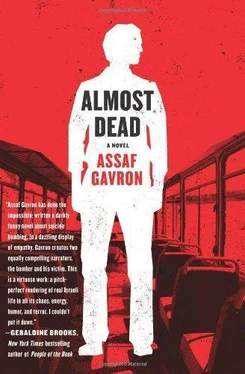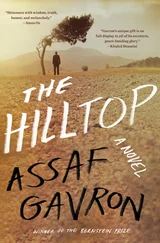My eyes filled with tears. My father would have killed me with his bare hands, but violence was never his way. My father is profoundly disappointed. I promised him I wouldn’t get into trouble. He only wanted to live peacefully. He thought Bilahl and his friends were throwbacks to the Middle Ages. He thought we were going to give him a heart attack. But I wanted my life to be worth something. I hadn’t done what he asked me. Tommy sat there waiting and I began to cry, and my head spun with thoughts of my disappointed father, my dead mother, my raging brother, and Rana’s soft, clear voice. I got up and shouted and threw the pillow at the wall, because all I saw, every day, all day long, was walls. Walls and the grey glass of the TV and blood: whole days went by without my seeing anything else.
I looked around the filthy little apartment, went to the bathroom, put my head in the sink and turned on the cold water tap. I badly needed to wake up.
Despite breakfast and the omelette in pita, I headed straight to the dining table in the Guetta house. It felt like the natural place to gravitate to. I filled a blue plastic plate from the bowls of salad that I was told Giora’s aunts had worked all morning to make: tabouleh, tomatoes with hot chillies, goat’s cheese with sun-dried tomatoes.
The house was thrumming with activity. Dozens of people were entering or leaving or milling about and talking. Outside, rain was pouring down the windows. It seemed as if the shiva was drawing life into the house, charging the building with life in order to compensate for its loss. Mr Guetta was holding Shuli’s hand and whispering in her ear, tears on his cheeks. Since the only person I knew in the room was occupied, I found myself a chair and concentrated on my salads.
The next time I raised my eyes, Shuli was embracing Mrs Guetta and Mr Guetta was staring at me. I returned the look and he gave a sad smile. I realised I ought to go to him and stood up, in my hand a half-empty plastic plate. He encouraged me with his smile. I looked for a place to lay my plate but the flat was too crammed, so I just headed towards him, shifting my plate to my left hand and extending my right. ‘Mr Guetta, it’s a pleasure. I’m Eitan.’ He looked me up and down, eyes pausing momentarily on the plastic plate. Who knew what Shuli had told him?
‘You’re a friend of Giora’s from Tel Aviv?’ So that was what I was meant to be.
‘Ah…not exactly. I just saw him on the Little Number…on the bus. I got off before…I talked a little to Giora before I got off.’
‘Yes, that’s what Shuli said. Have you any idea what he was doing in Tel Aviv?’
‘Uh…look, Mr Guetta, I…no. I haven’t. Not a clue.’ I looked in hope towards Shuli but she was still in the arms of Mrs Guetta, both of them in tears, Shuli’s mascara running for the second time that morning. I probed my plate with a fork and speared a cherry tomato, which I hurriedly shovelled into my mouth. Someone came over to hug Mr Guetta: my saviour, I thought. But as I turned to go he reached out to touch my shoulder.
‘Hold on, Eitan.’
‘Sure, Mr Guetta, I’m sorry. I thought you needed to talk to other…’
‘No, no. I just want to know why he came to you. Why he was in Tel Aviv. That’s all. Because he didn’t tell us he was going there. We didn’t think he had any reason to go there. I just need to understand.’
‘But I really can’t tell you anything, Mr Guetta. I just saw him on the bus. I exchanged a couple of words with him. He didn’t say what he was doing there.’
‘What did he say, exactly?’
Should I tell him the truth? He only wanted to know what his son’s last words were. He was clinging to the last day of Giora’s life. The need to decipher his actions or his motives was holding him together. As if that would change or explain anything. Should I tell him that his son asked me what I thought about the terrorist? He looks OK to you, right?
‘Nothing,’ I said, gesturing with my plate. ‘I don’t remember exactly. Not anything important. We were laughing about something on the radio maybe…The driver, the driver was saying something on her intercom and someone in the office shouted at her…I…’
‘The driver?’ Mr Guetta paused to receive a kiss on his cheek and someone said, ‘You see what these barbarians have done now? Bab al-Wad, as if nothing has changed! This government’s going to pay the price, Guetta, you wait and see.’ I saw an empty section of table to lay my plate on, took advantage of the window of opportunity, and a hand grasped my arm and a good smell engulfed me.
‘Let’s get out of here, Croc.’
There was a giant panda in front of me. I looked in her eyes and I felt as if I was beginning to drown. She said, ‘Stop staring at me.’ I said, ‘OK.’ She smiled.
In the car — she gave directions and I drove — we passed roundabouts, large buildings, ascended a slope and descended again, went through a traffic light and down an alley where she told me to park. ‘Where are we going?’ ‘To Montefiore.’ ‘Moses Joel Montefiore?’ We walked down the alley. It was freezing. The wind in a few exposed spots in Jerusalem can be cruel. The only people visible on the streets were the security guards at the entrances to restaurants — the only reminders that there was anybody still living in the city at all. We made our way across the terraces, past the replica of the old Zionist’s famous carriage, to the viewpoints looking east over the valley. She vaulted up on to a low stone wall, her hair flying in the wind, and said, ‘Look at the desert! Have you got anything like that in Tel Aviv?’ I looked at the grey hills and the treeless ravines and shivered. ‘Come on, then,’ she said.
In the café she cleaned the streams of mascara from her eyes.
Ordered hot chocolate.
Clasped her hands around it.
A security guard (an additional shekel on the bill), a barman, and what looked like a dog curled up at the foot of the bar. Outside the window, Jerusalem seemed to radiate an intense cold, as if it were the city itself that had mobilised the clouds and the winds to scour the humans from its streets.
I found her crying when I returned from the toilet.
I told her my theory about the Guetta family, the much-loved mythical ex and Shuli’s comparatively low status. She laughed. There was no ex. Shuli got along fine with his family and friends.
‘I’m still angry with him,’ she said. ‘I don’t understand what he was doing there.’
I glanced at the paper on the table between us: ‘Like Sitting Ducks’, etc. Here too the drawing had my car’s colour, model and direction wrong. At least they had Humi the soldier lying in the right place.
‘Well, would you like to find out?’
‘How?’
I got Giora’s PalmPilot out, opened the diary and moved to sit next to her. On the date of his death a meeting had been scheduled at 8 a.m. It said: B-MW. Coffee Bean, Yehuda Maccabi and gave a phone number. I called. No answer, so I left a message: please call back urgently, it’s to do with the meeting with Giora Guetta. ‘You see?’ I said. ‘We’re already a step ahead.’ ‘Ahead? We’re not ahead of anything. What does BMW mean?’ ‘Relax,’ I said in my most authoritative voice. ‘Maybe he was buying a car?’ ‘What did he need a car for?’ ‘You’ll see. The phone’s going to ring now.’
It did, but it turned out to be Jimmy.
‘Where the hell are you, Croc? What’s going on, disappearing like this without any notice?’
‘I’m in Jerusalem, Jimmy. Long story. I couldn’t get in touch because my phone was involved in this shooting in Shaar Hagai…’
‘Your phone was involved?’
Читать дальше












